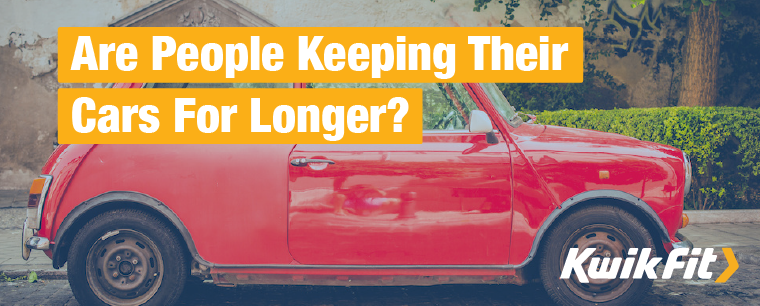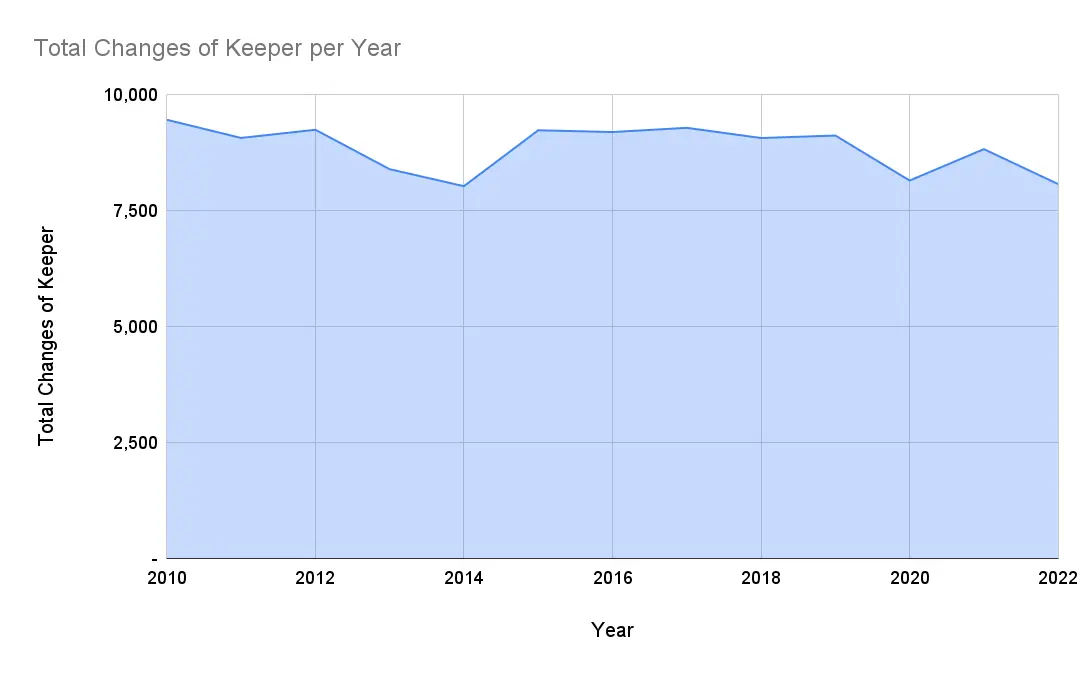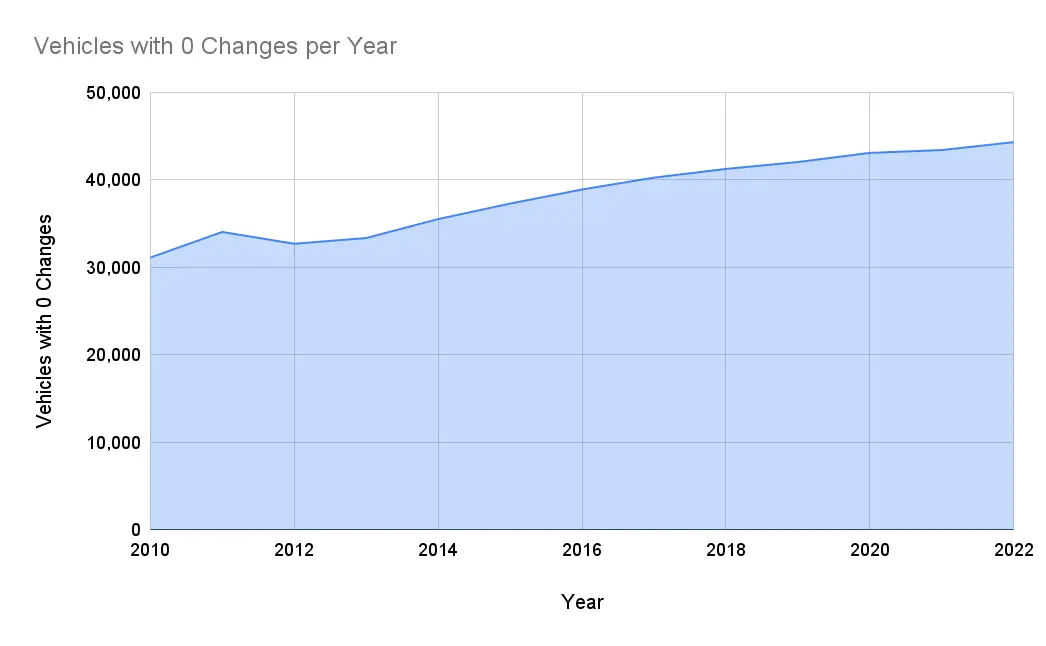Are People Keeping Their Cars For Longer
Jack Dreyer | Friday 15th March 2024 12:00pm

According to official government data, the number of people holding onto their cars has seen a steady increase. Over the last 10 years up to 2022, fewer people seem to be trading in their cars for new ones.
It is worth noting, though, that the statistics showing there to be an uptick in car trade-ins seem to be slightly skewed by people who are trading multiple vehicles in a single year. On the whole, however, the figures show that people are starting to keep their vehicles for longer ó but why? And, what does that mean for the future of car trading?
Read on to find out.
How long should you keep your car?
Conventional wisdom, often conveniently put in place by car sellers, is that itís best to keep a car for anywhere between 2 and 10 years before eventually trading it in. There is a truth to this in the sense that car parts can degrade quickly over time and some integral mechanisms of a car become very costly to replace, but this does depend on how regularly you use your car, what for, and, most importantly, how often you maintain it.
Itís no coincidence that the number of people holding onto their car, perhaps longer than intended, has gone up since the pandemic and during the cost of living crisis. But, the way we trade cars has also changed and there are some fundamental shifts in the way people now purchase and treat their vehicles.
How buying and trading cars has changed
Firstly, the new car market has been somewhat stagnant in the last few years, although there are signs of growth on the horizon, other sources suggest that overall production and sales of new cars may go down globally between 2024 and 2025.
Part of this is due to the overall state of the economy, but there are other factors such as increasing costs and charges from schemes such as ULEZ (Ultra Low Emissions Zone) and the fact that fewer young people are even learning to drive. In fact, where just under a half of people aged 17-20 had a licence between 1991 and 1994, in 2014 that figure went down to just 29%. According to The Times in 2023, around 75% of young people now are refusing to learn how to drive altogether.
From a purely business perspective, this means that a large proportion of people simply will not be entering the market, which could lead to the flatlining of production.

The chart above shows the stagnant numbers and gentle decline in total changes of keepers per year for cars in the UK. However, a clearer chart below shows us the undeniable rise in the number of vehicles with 0 changes in keeper.

Online car trading vs car dealers
One of the ways that trading has changed in recent years is with the emergence of online trading, or rather, its increased efficiency and ease. Whereas in the past individual sellers would have to make posts on specialist forums, reach out to local area groups and use sites with some rather dodgy reputations, now they can simply access Facebook Marketplace.
Although over half of second-hand car sales are still made by car dealerships, that does mean a very large chunk of sales are happening between individuals and this will probably rise as people feel the pinch during the cost of living crisis. There are pros and cons to both methods but essentially it can be boiled down to the fact that, with an individual seller, you are paying less, but get less security.
Predictable and unpredictable costs and charges
There are many good arguments for why you should change your car fairly regularly; CO2 emissions over a carís lifetime, cost of maintenance, depletion of core parts, loss of efficiency, and rising charges. However, it can often feel like if you donít change your car then youíre running on borrowed time and sooner or later your car will break down on you, which isnít entirely true.
According to This is Money, the number of people looking to scrap their car after the introduction of ULEZ saw a 50% rise in London, and nearly an 80% increase in surrounding areas compared to the year before. Scrapping has its own pros and cons, and plenty of arguments which make sense on both sides but it does add to the complication around the car market and what the future of driving will look like.
Best car buying practices
Ultimately, however, it does seem that despite all of the other influences on the shifting face of vehicles (especially combustion vehicles) in the UK - the crux of the issue is that simply people are trying to save money and canít afford to take risks changing cars.
However, any choice comes with a risk. Keeping a car means you avoid certain additional costs and problems from purchasing a new one, but it is important to keep it maintained and thoroughly checked. If your car is getting a little long in the tooth, itís imperative that you do all you can to make sure that youíre not left with a nasty surprise which could be very expensive to fix, or force you to buy a new car anyway, and potentially during an even more financially inconvenient time.
That being said, if you do purchase a car from an individual to save money, itís very important that you follow the right checklists to make sure the car is legal and safe to drive, and that you do the appropriate paperwork, MOT, and checks to see if it is actually healthy and roadworthy.
Keep your car costs low
The cost of living crisis means that many people are facing an increase in daily, weekly, and monthly payments on everyday things. As this adds up, it starts to create holes in our finances where there werenít any before. Sudden one-off payments or fees can be greatly disruptive to our financial stability; so, itís important to keep as much of our outflow as predictable as possible.
Kwik Fit has the Kwik Fit Club to help with this; with various tailored membership packages which include Premium tyres, cover on wear and accidental damage,* and up to 8 alignment adjustments over the contract.** There are also plenty of optional extras and additional benefits that mean many of your car costs can be tidied away within a predictable monthly sum.
If youíd like to give your older car some well-needed maintenance, book in for a service at your local Kwik Fit. Find out whatís included and which servicing option is best for your car, or get in touch with us and weíll set you up with one of our expert technicians for further advice.
*Subject to our fair use policy
**Subject to spec of vehicle
Any facts, figures and prices shown in our blog articles are correct at time of publication.
Featured Articles
Is it Illegal to Drive With One Headlight?
Saturday 19th July 2025
Wondering if itís illegal to drive with one headlight? Learn about the safety risks and penalties of illegal blown bulbs and why you should fix them promptly.
Air Con in EVs & Hybrids: Experts Answer Your Questions
Monday 30th June 2025
Does air con drain EV batteries? Can you use the air con while charging an electric car? Find out the answers to these questions & more from Kwik Fitís experts.
Why Is Your Car Making a Noise? Fixes & Tips
Friday 13th June 2025
When your car starts making unexpected noises, it can certainly be quite disconcerting; it may be nothing to worry about, but hereís what you need to know.









